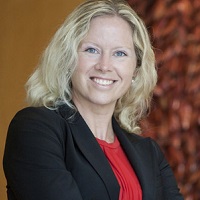Foraker builds data-sharing relationships to improve health during COVID-19 pandemic and beyond
July 7, 2020

Dr. Randi Foraker
The Academic Women’s Network selected Randi Foraker, PhD, for their 2020 Presidential Award for exceptional service in science and medicine during the COVID-19 pandemic.
Foraker – who received a doctorate in epidemiology from the UNC Gillings School of Global Public Health in 2010 – was chosen for this honor based on her leadership of two different centers at Washington University in St. Louis, Missouri, where she is an associate professor of medicine; she directs the Center for Population Health Informatics at the Institute for Informatics and the Data and Training Center at the Institute for Public Health.
Foraker is leveraging the expertise of these centers to serve the needs of the St. Louis area in two important ways: by harmonizing and analyzing data from three large health care providers and by working with local health departments to create a regional data alliance. She is passionate about data, but not just for their own sake. A background in education and health promotion, combined with training as an epidemiologist, means Foraker knows how to use health data to empower health care clients and providers.
Foraker received a Bachelor of Education and a master’s degree in health promotion from the University of Iowa before serving as a high school teacher and HIV outreach worker. A move to Minnesota brought her to the Mayo Clinic in Rochester, where she coordinated the Mayo Outreach to Students and Teachers program to provide education in schools about smoking and other health-related topics.
In this role, she also recruited participants for smoking cessation trials. She did not have a research background, so her boss, Ivana Croghan, PhD, encouraged her to attend weekly research meetings to see how “a small piece of the puzzle really advanced the project,” she said. This experience sparked Foraker’s interest in the field of epidemiology, and she began to take classes in clinical epidemiology and biostatistics.
Foraker came to the Gillings School to study cardiovascular disease epidemiology under Wayne Rosamond, PhD, building on her work at the Mayo Clinic.
“Gillings has helped my career progress because the faculty and students provided an environment for me to get excellent methodological training that can be applied to any problem,” said Foraker. “That skillset is valued, whether in a college of public health or college of medicine, and whether you’re trying to address heart disease or issues related to infectious diseases. The training that I received at Gillings is second to none.”
Foraker’s work with informatics and data science advance a regional understanding of health that is important for fighting a pandemic and necessary to address health inequity.
“Washington University serves as a source of truth for the region around racial disparities, what predicts mortality and the most common comorbidities that we see among patients,” Foraker said. “It’s a pretty big body of work that involves data architects and data analysts.”
Her efforts to build a regional data alliance are what fulfilled the service component of the award. She meets weekly with the leadership and staff of various departments of health in the St. Louis region – which comprises 16 cities and counties with separate public health departments – to address their data needs; negotiate data-sharing agreements; and encourage appropriate sharing of data from the health system, federally qualified health centers, labs and health departments.
“The long-term vision for sustainability is to create a regional data alliance and a public health data infrastructure,” said Foraker. “It’s not just COVID-19; the alliance can leverage the same streams of data to address sexually transmitted infections and chronic diseases, like diabetes. Moving these data out of Washington University and into this regional data alliance will allow multiple academic institutions, health systems and public health jurisdictions to contribute to the broader cause.”
According to Foraker, this alliance is “sorely needed,” especially as fragmented data confound attempts to get a clear picture of the pandemic.
“St. Louis County produces maps of the disease, and there’s a hole where the city is, because the county doesn’t have those data,” said Foraker. “We could leverage this public health data infrastructure to feed public health dashboards and provide a source of truth for the region.”
Foraker also served for several years as an associate professor of epidemiology, cardiology and biomedical informatics at The Ohio State University before moving into her current role at the Washington University School of Medicine. When she’s not thinking about data alliances or the pandemic, she’s still trying to use data to improve health. She focuses on developing clinical decision support tools that are embedded in electronic health records. These visual, interactive tools show health care clients and providers the most effective ways to reduce clients’ risk of cardiovascular disease.
Contact the UNC Gillings School of Global Public Health communications team at sphcomm@unc.edu.
